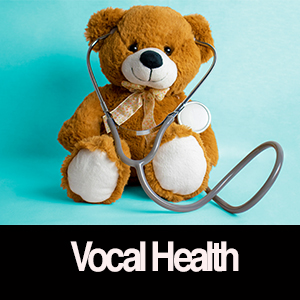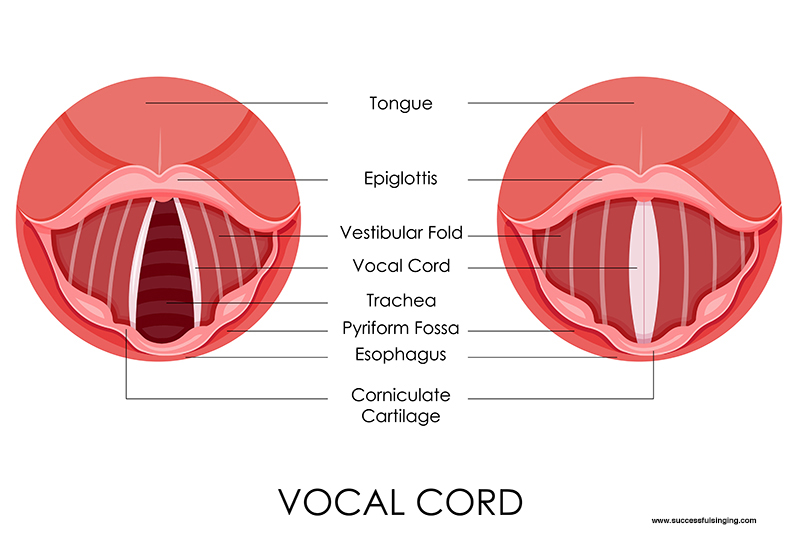Guide to Vocal Health
Guide To Vocal Health

Guide To Vocal Health – The vocal cords (also known as vocal folds) are two bands of elastic muscle tissue. They are located side by side in the voice box (larynx) just above the windpipe (trachea). These membranes are fixed at one end, giving them a V-shaped and open and close to allow for breathing and sound production.
Sometime infection or over-use causes our vocal cord to inflame, resulting in hoarseness. Continued over-use, shouting, and even whispering can, over time, result in damage of the vocal cords, which needs medical attention.
What can you do to look after your voice?
Warm-up your voice before you start to sing is very important. So many singers, just get out there and start belting. You wouldn’t see an athlete tearing around the track without warming up their body first, so offer your voice the same consideration.
It doesn’t take much effort.
- Start with a few deep, controlled breaths, followed by some humming.
- Hum your favourite song, if scales are not your thing.
- Use your voice to make a squeaky door being opened sound (use the ee sound to slide up and down your vocal range).
- Move onto singing some of your gentler songs, before you start tackling the belters.
- Also know your limits. Don’t try to sing too high, or too low until you are warmed up enough. Start at a comfortable range and extend from there.

Vocal Hydration
Vocal hydration is extremely important. Our cords are delicate membranes, which dry out very easily (especially in dry, smoky atmospheres). So drink plenty of water.
Most people don’t realise that when we drink, that liquid doesn’t actually wash over our vocal cords. When we swallow, a leaf-shaped flap (epiglottis) comes over the windpipe to prevent food and liquid from going down into our lungs. So you need to be drinking plenty of water many hours before you start to sing, so that it is absorbed by the body and distributed to the parts where it is needed.
Steam inhalation is good at getting moisture onto your cords, either the old-fashioned way of a bowl of boiling water, a few drops of essential oil if you prefer, and a towel to cover the bowl and your head, while you inhale the steam, or there are automatic vapourisers and humidifiers readily available on the market.

Drinking – Alcohol will numb your senses. Normally, when you’ve not drunk alcohol, you know when your voice is tired or when you have pushed your voice too far because you will feel discomfort in your throat. But, these senses can become harder to notice once you have a drink or two Your ‘buzz’ can push your voice past its usual boundaries (this may take the form of singing or talking too loud, too high, too low, or simply for too long a time period) and you don’t notice your warning signs. You may wake up in the morning, with a sore head and no voice for several days (or in some cases several weeks or more!).

Smoking.
There are no health benefits to smoking, so either cut down or stop completely. Smoking affects your lung capacity, so you will struggle to hold onto those long notes. Also smoking irritates the membranes in the windpipe, resulting excessive mucus and a cough, which can inflame the vocal cords. in addition to the other health problems associated with smoking.
That leads me onto recreational drugs – if drinking and smoking are bad for you– drugs are even worse. Don’t go there!

What can you do if you get a sore throat/lost voice
Avoid abusing your voice throughout the day. Don’t talk for long periods of time – you will find your voice will get hoarse. Avoid whispering. This is stressful to your voice and can cause vocal fatigue. Do not shout over loud noises, such as machinery or concerts. I’ve know a few who have yelled at rock concerts, etc, and haven’t been able to sing for months afterwards. It’s just not worth it!
We’ve had lots of questions about what to do if you’ve lost your voice due to bacterial, or viral infections, hoarseness and voice loss. We are not doctors, and would always recommend you seek professional advice, but I can provide a few tips:
1. REST!!
2. Drink plenty of Water.
3. Avoid too much Tea, Coffee, Cream & Alcohol
4. Take plenty of Vitamin C (fruit, vegetables or tablet form) to aid your body’s natural defences. Hot Lemon & Honey or Blackcurrant drinks both contain vitamin C and can help. Grate a little ginger or turmeric into it too as these have anti-inflammatory properties.
5. Severe or prolonged coughing spasms can injure the vocal cords. Cough Syrup, Throat Sprays and Lozenges can help.
6. Steam Inhalation, with or without a few drops of Eucalyptus, Peppermint or other Essential Oil helps to clear the sinuses, and get moisture onto the vocal cords.
See your doctor if your symptom persist for more than a few days or your symptoms are getting worse.
7. Do NOT attempt to sing and avoid talking if you have a hoarse voice. Allow the inflammation to reduce and you start to feel better first. This may take several weeks to recover to get your voice back..
8. On recovery start with some gentle humming for 5-10 minutes at a time and slowly build up to a few vocal exercises in your mid- range gradually expanding the range over several days. The rate of recovery will depend on the severity of illness and how experienced a singer you are. Any recurrence of hoarseness stop and rest the voice for another couple of days.

Eating and Drinking before performing
Drink lots of water so that your vocal cords are well lubricated. Also keep water close by when you do perform – but just remember, if you are performing and you got a full bladder, you have to wait until you’ve finished. Don’t get caught short and make sure you visit the loo before you go on stage!
Eat lightly before a performance. Abdominal breathing is uncomfortable on a full stomach.
Cold things may constrict your vocal cord muscles. Hot things may burn or warm them too much, so try to eat and drink things at a room temperature
Milky drinks and dairy products may cause your body to produce too much mucous that can clag up your vocal cords. If you’re prone to this, avoid dairy products before you sing
Sprays, Lozenges or Gum are good at helping to produce saliva, which helps lubricate your throat.
If symptoms continue, seek advice from your own Doctor.

Practice Makes Perfect
It has to be said that the more you practice, the better you get.
If you have a problem with a particular phrase or part in a song, concentrate on that phrase until it flows naturally, then move on to another problem and work on that and so on.
Depending on how serious you are about singing, you should aim to at least 1⁄2 hour practice on most days. This helps your breathing and strengthens your vocal cords, without over- working them.
Think of your vocal workout like building yourself up in the gym. The more you do, the stronger you get. The same goes for your voice.
Don’t sing to the point of hoarseness. You will run the risk of damaging your vocal cords. Constantly overworking your voice can cause nodules on your vocal cords, which can affect your voice.
Whatever you are worst at, practice the most. It is pointless practicing songs you already sing well. Practice the songs or parts that you struggle with the most, until these become easy for you. Just run over the ones you sing well once a week or so, so that you don’t slip into any bad habits.
Use a recording device to record yourself when you practice. You will hear what you sound like and find out how you are doing, where you are going wrong, give you ideas on how to change something, etc. You will find this a very useful learning tool
And Most Importantly – Take time out. We all need to have a break. You need a complete rest from singing at least once a week and I mean a complete rest. No practice, no singing along to your favourite records, no singing in the bath etc. Also if you done a hard or long gig, then give your voice a rest the following day.


